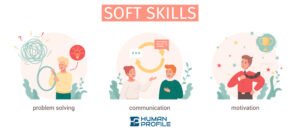Motivating and retaining talent are essential challenges for organizations. In addition to competitive salaries and benefits, employees crave a sense of mission and a clear path to professional growth. In this regard, profile analysis plays a key role. It helps to understand employees’ behavioral characteristics and communication preferences, allowing them to align their personal ambitions with opportunities within the company.
Self-awareness and self-development
Profile analysis provides valuable self-knowledge. Employees can identify their strengths and areas for improvement, work preferences and personal motivations. This helps them not only to grow personally, but also to contribute more effectively to the organization.
Alignment with the organizational culture
It is essential that employees are aligned with the company’s culture and values. Profile analysis helps determine whether personality and personal values are in harmony with the organization’s culture. Employees who identify with the culture tend to be more committed and engaged.
Objectives and development paths
Based on the profile analysis, employees can define short- and long-term career goals. They can identify the areas of development they want to explore and create clear plans to achieve these goals.
Professional growth and internal mobility
Profile analysis helps employees recognize opportunities for growth within the organization. This may involve lateral moves to acquire new skills, promotions or transitions to roles more suited to their profile.
Communication with leadership
The results of the profile analysis provide a solid basis for meaningful discussions with leadership. They can be used to create personalized development plans and set clear expectations.
Increasing motivation and involvement
Employees who have a clear career plan, aligned with their personal characteristics, tend to be more motivated and committed to their work. They have a sense of direction that keeps them engaged.
Retaining talent
Offering opportunities for development and growth increases the likelihood of retaining talent in the long term. This reduces the costs associated with turnover and helps maintain a highly qualified team.
In conclusion, profiling plays a crucial role in creating effective career plans and motivating employees. It allows individuals to get to know themselves, identify professional goals and align their objectives with the organization’s opportunities. When employees see a clear path for their development within the company, they are more likely to stay, contribute and thrive in their roles. This benefits both the employees and the organization as a whole.






